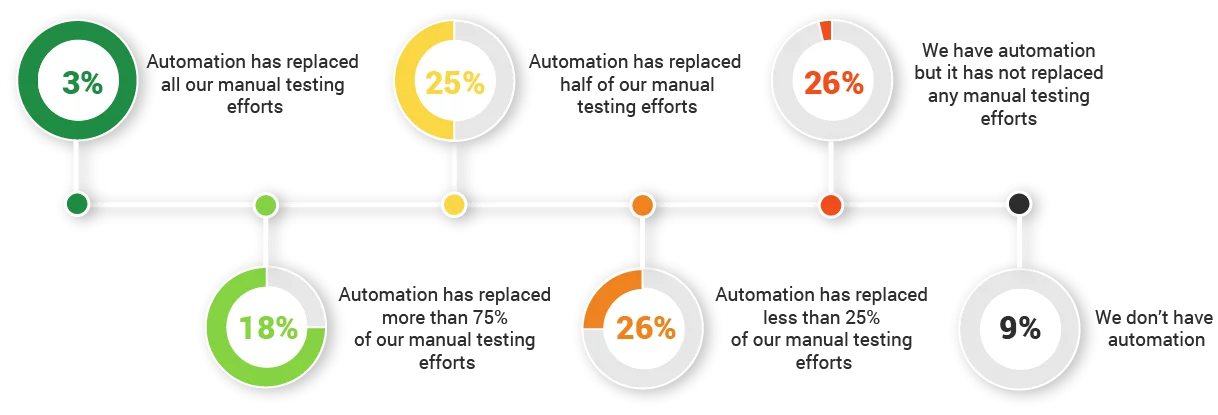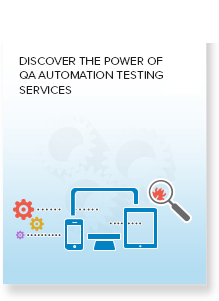QA automation testing services: Empowering your testing process
The technological world is ever evolving. Software development timelines shrink and the market demands top-quality products. However, traditional manual software testing services are insufficient for today’s software development needs.
This is where QA automation testing comes into play. Companies can harness the capabilities of automation tools and frameworks. This can help them overcome the manual testing challenges.
In this blog post, we will delve into the benefits of QA automation testing services and how it revolutionizes the software testing process.
What is automation testing and why do you need it?
Automation testing is the use of automated testing tools and scripts to execute pre-defined test cases and verify software application functionality, performance, and reliability. It is a process of automating manual testing tasks by employing specialized software tools. These tools simulate user interactions, validate expected outcomes and compare actual results with expected results.
By including automation testing into your software development process, you can improve the software quality and reduce time-to-market. Here are some key reasons why you need automation testing:
Efficiency
Automation testing allows you to execute tests faster and more efficiently. Automated test scripts can be created to perform repetitive tasks, such as data entry and validation, without human intervention. This saves significant time and effort. Optimize your testing process and allocate resources more effectively.
Time savings
Accelerate the testing process by executing tests simultaneously and completing them in a fraction of the time it would take manually. This allows for faster feedback loops and quicker issue identification. Quickly fix bugs and reduce time to market.
Enhanced test coverage
Automation for application testing ensures consistent and comprehensive test coverage. Automation tools can execute several test cases and scenarios, covering a wide range of functionalities and configurations. Minimize the risk of missing critical defects and ensure thorough software validation
Accuracy
Automation tools perform complex calculations and data comparisons accurately, eliminating human errors. Get accurate and reliable results and enhance the overall quality of your software.
Scalability
As your software applications grow in size and complexity, scaling manual testing efforts can become a daunting task. Automation testing allows easy scaling.
It enables tests to be executed across various platforms, configurations and devices. Gain flexibility to handle large-scale testing requirements. Also, ensure that your software performs well in different scenarios and environments.
Cost savings

Source: A survey by Practitest
There may be an upfront investment in setting up automation frameworks and developing test scripts. Automation testing saves significant costs in the long run. You can optimize resource utilization and allocate skilled testers to more critical tasks. Additionally, automation allows for early bug detection, preventing costly fixes and minimizing the impact of defects on the final product.
Comparison between QA automation testing and manual testing
| Manual testing | Automation testing | |
| Execution speed | Manual testing requires human testers to perform test cases step by step, which takes more time. | Automation testing uses automated scripts to execute tests, which run faster than manual execution. |
| Human intervention | Manual testing relies on human testers to execute tests and validate results manually. | Minimize human involvement once test scripts are created. This reduces manual effort during test execution. |
| Scalability | Manual testing may face challenges when scaling up for large and complex applications or increased testing requirements. | Automation testing offers easy scalability. This allows execution of tests on multiple platforms and configurations without much hassle. |
| Time efficiency | Manual testing requires testers to execute tests step by step, which can be time-consuming. | Automation testing executes tests faster as multiple test cases can run simultaneously. This saves significant time in testing. |
| Cost efficiency | Manual testing relies on skilled testers, which can be costly in terms of resource allocation and hiring. | Automation testing optimizes resource allocation by automating repetitive tasks, reducing overall testing costs in the long run. |
| Regression testing | Manual testing requires retesting previously tested functionalities with each new release, which can be time-consuming. | Automation testing allows automated script reuse, making regression testing faster and more efficient. |
Some stats to highlight key differences between manual and automation testing:
- Manual testers typically spend between 50-70% of their time searching for test data. Automated app testing suites can automatically retrieve test data.
- By increasing automation in the testing processes from 70% to full automation, you can reduce testing-time costs by 25%.
- By using AI-driven test automation, you could see up to a 90% reduction in test times versus manual testing.

Discover The Power of QA Automation Testing Services
Assurance testing. Before the application is made public or sent to the client, it needs to have addressed every issue and bug that might have crept in during the coding of the application. Delegating a dedicated engineer to perform manual tests can get cumbersome.
What to choose: automation testing or manual testing?
Deciding whether to choose automation testing or manual testing depends on various factors and considerations. Here are a few points to help you make an informed decision:
Test coverage: Automation testing is beneficial when you require extensive test coverage, especially in repetitive or complex scenarios. It can execute several test cases quickly and consistently. Manual testing, on the other hand, is suitable for exploratory testing, usability testing and subjective assessments that require human intuition and judgment.
Time and efficiency: If you have limited time and need faster test execution, automation testing is preferable. It can execute tests much faster than manual testing, allowing for quicker feedback loops and shorter release cycles. However, automation testing requires upfront effort in script development and maintenance. Manual testing may be more suitable for smaller projects or when time constraints are not critical.
Cost and resources: Automation testing can be cost-effective in the long run as it reduces human tester reliance. It allows skilled resources to focus on critical quality tasks instead of repetitive manual testing. Manual testing requires a larger testing team and incur higher costs, especially for large or complex projects.
Application stability: Automation testing works best when application functionality is relatively stable. If the application undergoes frequent changes or has a high volatility level , maintaining and updating automation scripts can become challenging. Manual testing can adapt quickly to changes and is more flexible in such scenarios.
Test objectives: Consider the specific goals of your testing. Automation testing is well-suited to regression testing, load testing and performance testing. Manual testing is effective for ad hoc testing, user experience testing and identifying edge cases that automation may overlook.
In practice, a combination of automation and manual testing is often the most effective approach. This hybrid approach allows for the strengths of both methods to be leveraged.
It maximizes test coverage, efficiency and accuracy. Assess your project requirements, timelines, available resources and the nature of the application to determine the appropriate balance between automation and manual testing.
How Softweb Solutions’ QA automation testing services enable efficient testing?
At Softweb Solutions, we offer a comprehensive QA automation approach that helps organizations optimize their software testing processes. Our approach combines the following:
- Industry best practices
- Advanced automation tools
- Deep expertise in efficient, accurate and scalable testing solutions
Throughout the automation process, we focus on maximizing test coverage while minimizing false positives and false negatives. Our QA automation consultants work closely with development teams, providing timely feedback and ensuring that issues are addressed promptly. We believe in continuous improvement and continuously refine our automation approach to adapt to evolving technologies and industry trends.
Our expertise in QA automation services enables organizations to achieve their software quality goals while focusing their skilled resources on critical quality tasks.
Automate your software testing to save cost and time
QA automation testing offers significant advantages over manual testing in terms of efficiency, accuracy and scalability. It streamlines the testing process, leading to faster time to market and competitive advantage over competitors. Moreover, it enhances product quality by reducing human errors and ensuring comprehensive test coverage. Additionally, automation allows for the scalability and reusability of test cases across different platforms and configurations.
Contact Softweb Solutions today to learn more about our QA automation testing services.
Originally published at www.softwebsolutions.com on June 12th, 2023.
Post Your Ad Here
Comments